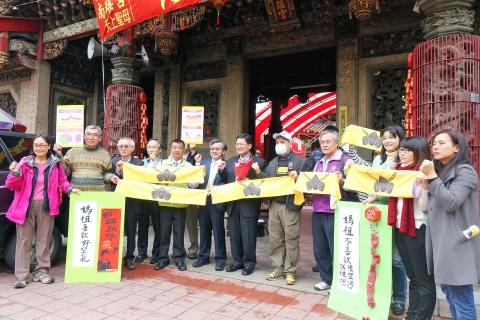Environmentalists yesterday urged Matsu devotees to refrain from setting off firecrackers, or burning incense and joss paper ahead of an annual religious festival next month to reduce air pollution.
Campaigners gathered at Nanyao Temple (南瑤宮) in Changhua City — the first stop of the annual Dajia Matsu Pilgrimage, one of the most celebrated religious activities in Taiwan — and presented a bouquet of flowers to Changhua Mayor Chiu Chien-fu (邱建富), urging people to replace incense and firecrackers with flowers.
Environmentalists measured air pollution levels inside and outside the temple with handheld devices, and recorded concentrations of PM2.5 — particulate matter measuring 2.5 micrometers or less in diameter — of between 50 micrograms per cubic meter and 60 micrograms per cubic meter outside of the temple.

Photo: Liu Shiao-hsin, Taipei Times
However, concentrations of PM2.5 reached more than 200 micrograms per cubic meter near incense burners inside the temple, illustrating the severity of air pollution caused by incense burning.
According to Environmental Protection Administration criteria, PM2.5 levels higher than 54 micrograms per cubic meter are considered hazardous.
Changhua Medical Alliance deputy director Chen Chih-yuan (陳志遠) said during an anti-pollution campaign in Nantou’s Puli Township (埔里) last year that PM2.5 levels were about 15 micrograms per cubic meter, but the level soared to 319 micrograms per cubic meter after a local temple set off fireworks in celebration of the birthday of a god.
“Air pollution caused by religious activities can be more serious than haze in China,” Chen said.
Taiwan Healthy Air Action Alliance founder Yeh Guang-peng (葉光芃) said burning incense generates benzene and polycyclic aromatic hydrocarbons, which can cause respiratory diseases, while particulate matter resulting from incense burning are smaller than bacteria and can easily enter the human body.
Fight for Health Women’s Group executive director Yen Shu-nu (顏淑女) said environmental protection is not in conflict with religions, and replacing ghost money with food offerings or charitable deeds has become a common trend.
“There are 91 temples in the city, but only 15 practice environmentally friendly worshiping. We called on the city office to encourage more temples to follow suit and reduce air pollution,” Yen said.
She said the group asked the city office to monitor air quality during the whole pilgrimage and to make public data collected to serve as a basis for future pollution reduction efforts.
Chiu said the office has instructed temples to reduce the number of incense burners, use fewer and thinner incense sticks and build environmentally friendly furnaces to burn ghost money.
The Changhua County Government has provided temples with electronic firecrackers to reduce the use of traditional fireworks during religious activities, Chiu added.

The manufacture of the remaining 28 M1A2T Abrams tanks Taiwan purchased from the US has recently been completed, and they are expected to be delivered within the next one to two months, a source said yesterday. The Ministry of National Defense is arranging cargo ships to transport the tanks to Taiwan as soon as possible, said the source, who is familiar with the matter. The estimated arrival time ranges from late this month to early next month, the source said. The 28 Abrams tanks make up the third and final batch of a total of 108 tanks, valued at about NT$40.5 billion

Two Taiwanese prosecutors were questioned by Chinese security personnel at their hotel during a trip to China’s Henan Province this month, the Mainland Affairs Council (MAC) said yesterday. The officers had personal information on the prosecutors, including “when they were assigned to their posts, their work locations and job titles,” MAC Deputy Minister and spokesman Liang Wen-chieh (梁文傑) said. On top of asking about their agencies and positions, the officers also questioned the prosecutors about the Cross-Strait Joint Crime-Fighting and Judicial Mutual Assistance Agreement, a pact that serves as the framework for Taiwan-China cooperation on combating crime and providing judicial assistance, Liang

A group from the Taiwanese Designers in Australia association yesterday represented Taiwan at the Midsumma Pride March in Melbourne. The march, held in the St. Kilda suburb, is the city’s largest LGBTQIA+ parade and the flagship event of the annual Midsumma Festival. It attracted more than 45,000 spectators who supported the 400 groups and 10,000 marchers that participated this year, the association said. Taiwanese Designers said they organized a team to march for Taiwan this year, joining politicians, government agencies, professionals and community organizations in showing support for LGBTQIA+ people and diverse communities. As the first country in Asia to legalize same-sex

MOTIVES QUESTIONED The PLA considers Xi’s policies toward Taiwan to be driven by personal considerations rather than military assessment, the Epoch Times reports Chinese President Xi Jinping’s (習近平) latest purge of the Chinese People’s Liberation Army (PLA) leadership might have been prompted by the military’s opposition to plans of invading Taiwan, the Epoch Times said. The Chinese military opposes waging war against Taiwan by a large consensus, putting it at odds with Xi’s vision, the Falun Gong-affiliated daily said in a report on Thursday, citing anonymous sources with insight into the PLA’s inner workings. The opposition is not the opinion of a few generals, but a widely shared view among the PLA cadre, the Epoch Times cited them as saying. “Chinese forces know full well that